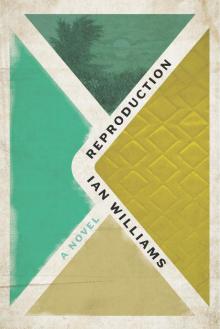- Home
- Ian Williams
Reproduction
Reproduction Read online
PUBLISHED BY RANDOM HOUSE CANADA
Copyright © 2019 Ian Williams
All rights reserved under International and Pan-American Copyright Conventions.
No part of this book may be reproduced in any form or by any electronic or mechanical means, including information storage and retrieval systems, without permission in writing from the publisher, except by a reviewer, who may quote brief passages in a review. Published in 2019 by Random House Canada, a division of Penguin Random House Canada Limited, Toronto.
Distributed in Canada by Penguin Random House Canada Limited, Toronto.
www.penguinrandomhouse.ca
Random House Canada and colophon are registered trademarks
this page and this page constitute a continuation of the copyright page.
Library and Archives Canada Cataloguing in Publication
Williams, Ian, 1979–, author
Reproduction / Ian Williams.
Issued also in electronic format.
ISBN 9780735274051
eBook ISBN 9780735274075
I. Title.
PS8645.I4448R47 2019 C813’.6 C2018-902713-4
C2018-902714-2
Book design by Lisa Jager
Cover images: (envelope) © Aha-Soft, (texture) © Jullius, both Shutterstock.com; (palm fronds) illustration from The Lady of the Forest [A novel] by L.T. Meade. London: Partridge & Co, 1889. Courtesy of The British Library.
v5.3.2
a
Contents
Cover
Title Page
Copyright
Part 1
XX 1.
XY 2.
XX 3.
XY 3.
XX 4.
XY 4.
XX 5.
XY 5.
XX 6.
XY 6.
XX 7.
XY 7.
XX 8.
XY 8.
XX 9.
XY 9.
XX 10.
XY 10.
XX 11.
XY 11.
XX 12.
XY 12.
XX 13.
XY 13.
XX 14.
XY 14.
XX 15.
XY 15.
XX 16.
XY 16.
XX 17.
XY 17.
XX 18.
XY 18.
XX 19.
XY 19.
XX 20.
XY 20.
XX 21.
XY 21.
XX 22.
XY 22.
X
Y
Part 2
Felicia: Exercise
Army: Extension
Heather: Exile
Oliver: Experience
Felicia: Expectation
Army: Expansion
Heather: Exposure
Oliver: Excuse
Felicia: Exchange
Army: Exegesis
Heather: Expression
Oliver: Explanation
Felicia: Extortion
Army: Extravagance
Heather: Ecstasy
Oliver: Explosion
The Sex Talk
Part 3
The Sex Talk
Part 4
Present
Acknowledgements
Credits and Permissions
About the Author
There is no technical means of reproduction that, up to now, has managed to surpass the mirror and the dream.
Elena Ferrante, The Days of Abandonment
Why does he keep returning? He keeps returning forever, keeps returning and returning and he is my father.
Adrienne Kennedy, Funnyhouse of a Negro
The truth is that wherever a man lies with a woman, there, whether they like it or not, a transcendental relation is set up between them which must be eternally enjoyed or eternally endured.
C. S. Lewis, The Screwtape Letters
If someone puts his hand here, or here, kiddies, it is sex, which you are not supposed to be having.
Lynn Coady, Hellgoing
On the one hand, we know today that our bodies keep a complete and faultless record of all the things we have ever experienced.
Alice Miller, The Body Never Lies
Now look objectively. You have
to admit the cancer cell is beautiful.
If it were a flower, you’d say, How pretty,
with its mauve centre and pink petals.
Margaret Atwood, “Cell”
Be fruitful, and multiply.
Genesis 1:28
LATE SEVENTIES
XX
1.
Both of their mothers were dying in the background.
XY
1.
Both of their mothers were still alive in the background.
XX
2.
Before she died her mother was prickly. Before her mother died she was. One more time. Before her mother died she, her mother, was prickly. One more time. Before her mother died she, her mother, prickled her, Felicia.
In the days before she died, her mother flew into unpredictable rages over the littlest things. Felicia said sardines instead of tuna when passing the tin and her mother blasted her.
Why you working yourself up so? Felicia asked.
Because a tuna is a big fish and a sardines is a small fish. A sardines—you hear the nonsense you have me saying?
Her hands vibrated so badly she couldn’t open the tin, the can, the tin.
At the next meal, Felicia didn’t pour tomato sauce quickly enough into a pot, a sauce pan, thereby essentially, judging from her mother’s reaction, assassinating the Archduke.
All the nutrients done gone already, her mother said. We might as well eat hair. You happy with yourself?
Later that evening, up in the room they rented from a Christian lady, a retired British-trained nurse, who stored her medical equipment in two trunks under the window, Felicia took her mother’s blood pressure. It was 190 over 110.
See. You provoking me. You provoking me, man.
Two days later it was 205 over 115. Her mother said it was because she had climbed the stairs. Or it was because because because the machine was broken. But when Felicia measured her own pressure, it was 110 over 60, which, instead of confirming the sphygmomanometer’s reliability, caused her mother to worry and divert the conversation to Felicia’s iron levels. She demanded menstruation details, when, how long, how heavy, what colour. Where could she get good beef? West Indian beef, not from these anemic snow-eating cows. The cast iron pot—the soap Felicia used had wrecked it. Nutrients, her mother said that a lot before she turned into a seahorse and drifted off.
And then over the weekend, her pressure went down to 146 over 90. They both laughed.
I telling you I know what I doing. Don’t feel I don’t know.
Her mother had taken to eating two cloves of garlic at each meal.
Sunday night, after the women wrapped their hair for bed, they leaned against the headboard in their rented room in the Christian woman’s house and excoriated the choir director for favouring the tenors. When her mother fell asleep, Felicia read a little Great Expectations for school. Three pages and she was out.
Her mother woke up and took the bus from Brampton to work in Toronto before she died. Obviously. When else would she take it?
* * *
+
Point taken. Yes, and then the office buzzed Felicia during period 4, Home Economics, and told her to bring her things with her, there had been an emergency.
But her mother was not in Emergency at St. Xavier hospital. In fact, Emergency was taped closed. Felicia imagined the worst, that her mot
her wasn’t simply dead but that a grenade had gone off in her chest and destroyed a section of the hospital. A police officer directed Felicia and a couple with a baby to an alternate entrance.
Felicia found her mother in Palliative, sharing a room with an elderly woman. It was strange to see her mother sleeping in public. She was normally a vigilant woman with chameleon eyes that seemed to move independently from one point of suspicion to another. Now, although they were both closed, she seemed uneasy, perhaps with the fact that her bra had been removed by strangers and her breasts splayed unflatteringly sideways.
Between the two beds, a man stood holding his wrists like the Escher print of hands drawing themselves. It would become his characteristic position. From forehead to jaw, his head was the same width as his neck. From shoulders to feet, he seemed constrained in a tight magic box, ready to be sawed in two. Put together, he comprised two rectangles stacked on each other—a tall, abstract snowman. His pants were wet from the knee down. Despite that, Felicia presumed he was the doctor because he was a man, a white man, a middle-aged white man, wearing a pinstriped shirt, but it turned out he was only a man, a white man, a middle-aged white man, wearing stripes and gripping his wrists.
Unconscious, Edgar said.
Unconscious or sleeping? Felicia asked.
Unconscious, he repeated. He presented the woman in the other bed as proof of his medical expertise. My mother. She’s sleeping.
His mother’s mouth was open. There was brown industrial paper towel on her chest to catch the leaking saliva. She gave the impression of needing to be laced up—as if by pulling the strings of a corset one could restore her mouth, her skin, her posture, to their former attentiveness.
She’s not going to make it, Edgar said. He flicked the bag of intravenous solution with his middle finger, then looked for some change to register in his mother. Seconds later, she began coughing. Her cheeks filled with thick liquid as Edgar searched for a cup, her spittoon. Felicia happened to swallow at the same time as his mother and while looking at the lump go down the woman’s throat, she felt the phlegm go down her own. She pulled the collar of her coat tight around her neck.
Felicia turned back to her mother. Her mother was so careful about applying makeup and now there was no trace of it on her. Where were her earrings? Her nail polish looked more crimson than red. Felicia knocked on her knuckles.
You hearing me? Felicia leaned in. You hearing me?
She thought she saw her mother frown. She frowned. Or perhaps it was a deception of light, the passing accident of light reflected from someone’s watch face.
Felicia heard the jaunty jingle of keys behind her.
So what brings your mother here on this fine autumn afternoon?
Without moving the rest of her body, Felicia twisted her cervical vertebrae to see if he was serious.
Mutter, here, couldn’t breathe, he offered. It’s her pneumonia. He put an odd stress on the her as if he were settling a dispute between feuding children: it’s her doll, let her have it. They think the cancer might have spread to her other lung. We’re waiting. It’s not easy. The waiting. Not easy at all. Come on, get in there.
Felicia turned around fully. She hadn’t seen snow since arriving in Canada.
Edgar was slouching in one of the chairs in the middle of the room, organizing his keychain. His hair was the colour of the dried oak leaves around her school.
What do you know? she said.
I’m just telling you how it goes. I’ve been through this once, twice, be—
No, I mean what do you know about my situation?
XY
2.
A pipe had burst on the second floor of St. Xavier and the ER was flooded. Whenever Edgar went down to smoke, he waded through water that was as deep as his knees, water so heavy he had to rotate his hips just to pull his legs through.
The hospital have more than one entrance, Felicia informed him.
Of course. We’re not in West Africa, he said. But the people, who wants to deal with people?
I’m not African, she said.
Edgar looked up from his keys. Nobody said she was. Good body, useful body. Her body seemed useful to the point of being industrial, assembled out of construction machinery, the kind of body you could ask to retrieve a pen from a tight space with its claw arm. It had calculated a series of compensations for its plainness. Her chest was modest but her broad shoulders gave her shape; her backside was flat but the anterior tilt of her pelvis lifted it; her hips had little flare but her wide stance created a triangular base that balanced the inverted triangle of her torso.
He turned back to sequencing the keys by the course of his day, not just by category—house keys, car keys, office building key, office department key, office key—and explained that the hospital had stopped admitting patients around lunchtime. They diverted incoming ambulances to a nearby hospital, closed the first two floors of A wing, and transferred patients wherever they could find beds.
He finished, That’s how they ended up together.
He lifted the spiral of the key ring with his thumb. What locks were these little duplicate keys for?
He finished again, That’s how they ended up— And finally, That’s how she ended up here.
They just pick Palliative out of a hat and throw she body in here? Felicia asked.
Edgar let the spiral snap close. That wasn’t what he said. She kept misunderstanding him.
I think you scored pretty good digs, considering that some people are four to a room. I was adamant that the capacity of this room not exceed two.
There were two chairs in the middle of the room back to back, and a yellow curtain divider. Felicia’s mother was on the side near the window, which overlooked a courtyard with a single leafless tree. Edgar’s mother was on the side near the bathroom. Both of them were covered with cream blankets, four stripes near the legs. Next to the beds were bags of liquid, tubes, metal stands, machines with faces asking to be read or touched. There was a small tissue box on each of their side tables.
The shed key he didn’t need to carry around. He said, It’s the best place either of them could be right now.
In Palliative.
In Palliative, he confirmed.
The sun had gone down. Felicia hadn’t yet removed her hat, which along with her coat looked unnatural on her, as if she did not choose them herself.
The boiler’s working fine, Edgar said with a smile. If she were friendlier he would try to encircle the fulcrum of her waist with his hands. The girls at the office always got a kick out of that. He said, You must be burning up.
But Felicia didn’t want to talk. To him. She spoke just fine to the nurse who came in to collect a medical history. Edgar learned more about her mother than he knew about his own sister-in-law. Her middle name was Eunice. She was born in March. She had a heart murmur. She was advised to leave school early because she fainted a lot as a child. But it might have been the heat. She’d had a boiled egg and porridge for breakfast. No allergies. She didn’t like baked beans, canned food in general, but it wasn’t an allergy. She was married. The husband was back home. The islands. No cancer in the family. No stroke. Hypertension, yes. She also had a sister who had sugar and had her foot cut off twice. Same foot twice. She had five to eight children. Three died in infancy. Felicia was the youngest. That’s how she ended up in Canada. Her mother couldn’t have any more children after Felicia. Something went wrong. Felicia didn’t know. She didn’t know.
Not everybody can have children, Edgar said. He was feeling left out because the women were talking as if he wasn’t there. No, he was only coming to Felicia’s rescue after the assault of questions. (He felt left out.) The woman had a heart attack. Why did he have to listen to her whole reproductive history?
Both Felicia and the nurse turned to him without seeing him, as if resting momentarily from the heat of their conversation.
Roll up those wet pants, Felicia said then led the nurse into the hallway. She doesn’t tak
e no medication except for a tablespoon of cod liver oil every morning with tea.
Edgar set the keys on Mutter’s bed. He rolled up his right pant leg. Much better. Why hadn’t he thought of that himself? He flexed his foot upward to admire his calves. He crossed his legs at the knee to display the muscle to its advantage when Felicia re-entered.
Edgar was deep in a cigarette when Felicia returned. His legs crossed, his socks off, the mark of the elastic smoothed somewhat but red.
She made a face and pulled the dividing curtain. Some people acted like they couldn’t breathe when the thinnest whiff of smoke came their way.
Leave it open, he said.
Your mother have pneumonia, no? Felicia said through the curtain.
I can’t hear you, Edgar said though he could.
I don’t see how you could be in here smoking when— Felicia coughed.
Speak up.
She pushed her head through the curtain. She wore the endearing expression of a young woman who wanted to wear glasses before her time just to be taken seriously. I don’t see how you could be—
I think you’ve forgotten how lucky you are not to be sitting downstairs in sewage right now, he said and finished his cigarette. What if he sorted his keys by size so he could find them in the dark? Lightbulbs, he had to buy one for the garage. He wouldn’t find a store open before his trip to Calgary tomorrow. Did the distributor people firm up lunch?
She pulled the curtain all the way around her mother.
More doctors smoke Camel than any other brand, he said. He might as well make himself comfortable. He took off his pants and hung them on the footrail of his mother’s bed to dry.
XX
3.
She heard him removing his pants: the belt buckle clanging against itself, the zipper, the whoosh of fabric. He sang softly to himself while doing it. His mother was coughing up the trapped badger from her lungs yet Felicia could hear him singing softly in a voice so high, so nostalgic of boyhood, that she resolved to be kinder to all God’s creatures.

 Reproduction
Reproduction Beijing Smog
Beijing Smog Disorientation
Disorientation Pieces of Me
Pieces of Me The Sentient Mimic (The Sentient Trilogy Book 2)
The Sentient Mimic (The Sentient Trilogy Book 2) The Sentient Collector (The Sentient Trilogy Book 1)
The Sentient Collector (The Sentient Trilogy Book 1) The Sentient Corruption (The Sentient Trilogy Book 3)
The Sentient Corruption (The Sentient Trilogy Book 3)